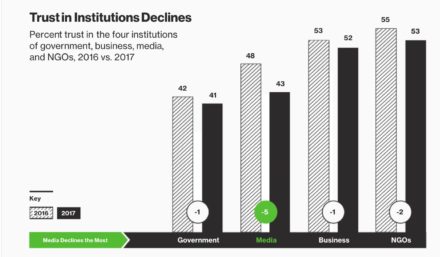Source of article The Jury Room - Keene Trial Consulting.
 It is disconcerting to watch the political upheaval in this country but similar things seem to be happening around the world. We just found a new group that measures societal changes in trust. Edelman has surveyed “tens of thousands of people across dozens of countries” for the past 17 years measuring levels of trust in business, media, government, and non-governmental organizations (NGOs) which are typically non-profit. According to Edelman, this year is the first time the average level of trust (“to do what is right”) in all four types of institutions decreased. They also report the following statistics:
It is disconcerting to watch the political upheaval in this country but similar things seem to be happening around the world. We just found a new group that measures societal changes in trust. Edelman has surveyed “tens of thousands of people across dozens of countries” for the past 17 years measuring levels of trust in business, media, government, and non-governmental organizations (NGOs) which are typically non-profit. According to Edelman, this year is the first time the average level of trust (“to do what is right”) in all four types of institutions decreased. They also report the following statistics:
71% of survey respondents said government officials are not at all or somewhat credible.
63% said CEOs are not at all or somewhat credible.
60% of respondents trusted “a person like yourself” (which was in line with trust in a tech expert or an academic). In other words, they say, peers are now on par with experts.
NGOs were most trusted, Business was a close second (only one point behind NGOs), media came in third, and government came in fourth. (These place finishes should be considered skeptically since their combined overall approval rating was less than 50%.)
The following graphic shows a comparison of 2016 and 2017’s trust ratings for the four areas surveyed.
In addition to the Executive Summary, you can view Global Results, and watch a video on what Edelman calls a trust implosion. When trust declines, populism rises says Edelman—and we have seen that internationally as well as here at home.
From a litigation advocacy perspective, perhaps most important for our work is their lessons on how trust has been broken—housed over at Scribd. Here are a few of their lessons we see as related to litigation advocacy:
Leading the list of societal concerns and fears we measured that are commonly associated with populist actions are corruption (69% concerned; 40% fearful); globalization (62% concerned; 27% fearful); eroding social values (56% concerned; 25% fearful); immigration (55% concerned; 28% fearful); and the pace of innovation (51% concerned; 22% fearful).
People are nearly four times more likely to ignore information that supports a position they don’t believe in; don’t regularly listen to those with whom they often disagree (53%); and are more likely to believe search engines (59%) over human editors (41%).
53% agree that the pace of change in business and industry is too fast. They worry about losing their jobs due to lack of training or skills (60%); foreign competitors (60%); immigrants who work for less (58%); jobs moving to cheaper markets (55%); and automation (54%).
The trust crisis demands a new operating model for organizations by which they listen to all stakeholders; provide context on the issues that challenge their lives; engage in dialogue with them; and tap peers, especially employees, to lead communications and advocacy efforts.
We will be paying careful attention to these issues as we pursue pretrial research and litigation advocacy in 2017. The ways that people (aka “jurors”) evaluate cases will reflect the kinds of mistrust and alienation that this study identifies. Anger seems to be intense, we are devaluing experts, concerned about those different from us, and not listening to those with whom we disagree. These states of being have direct relevance to our efforts to teach, explain, and persuade.

